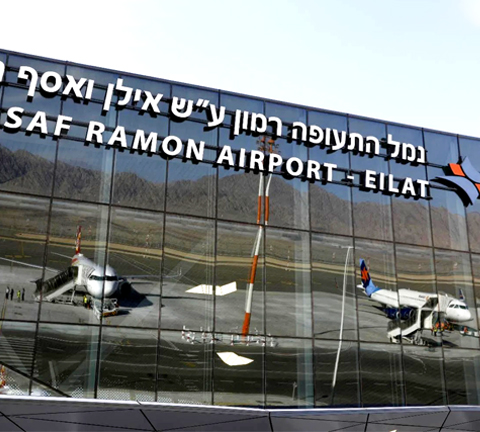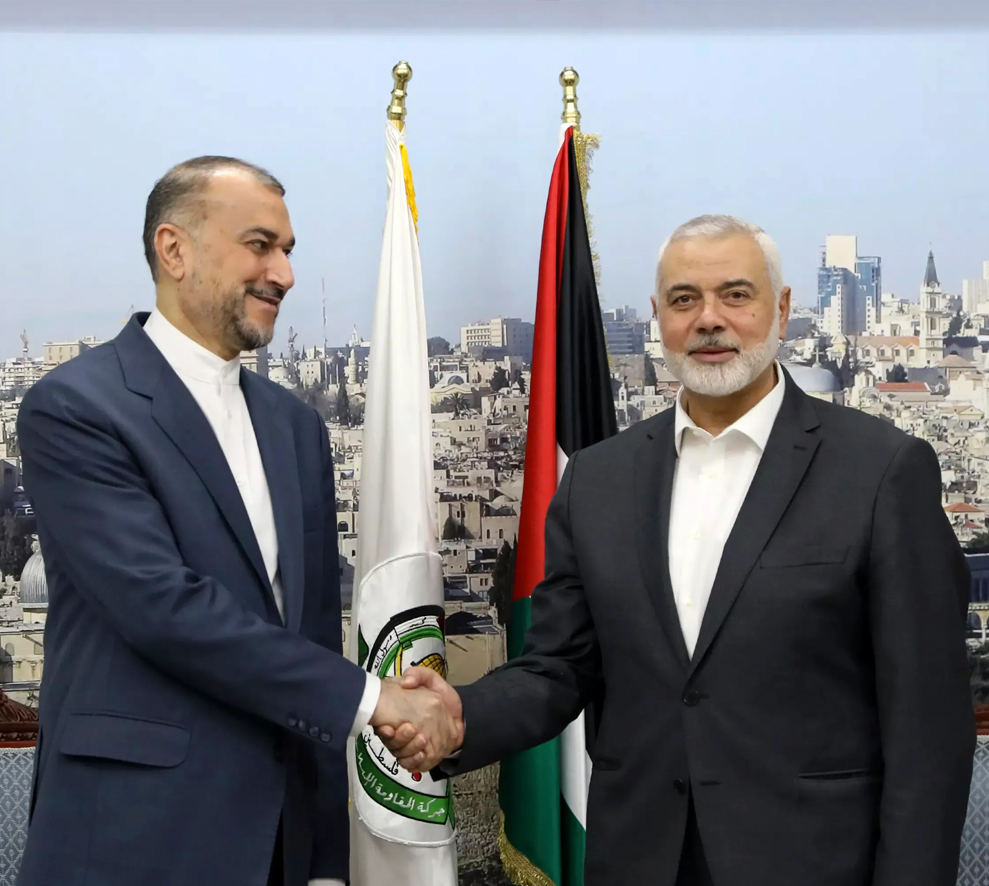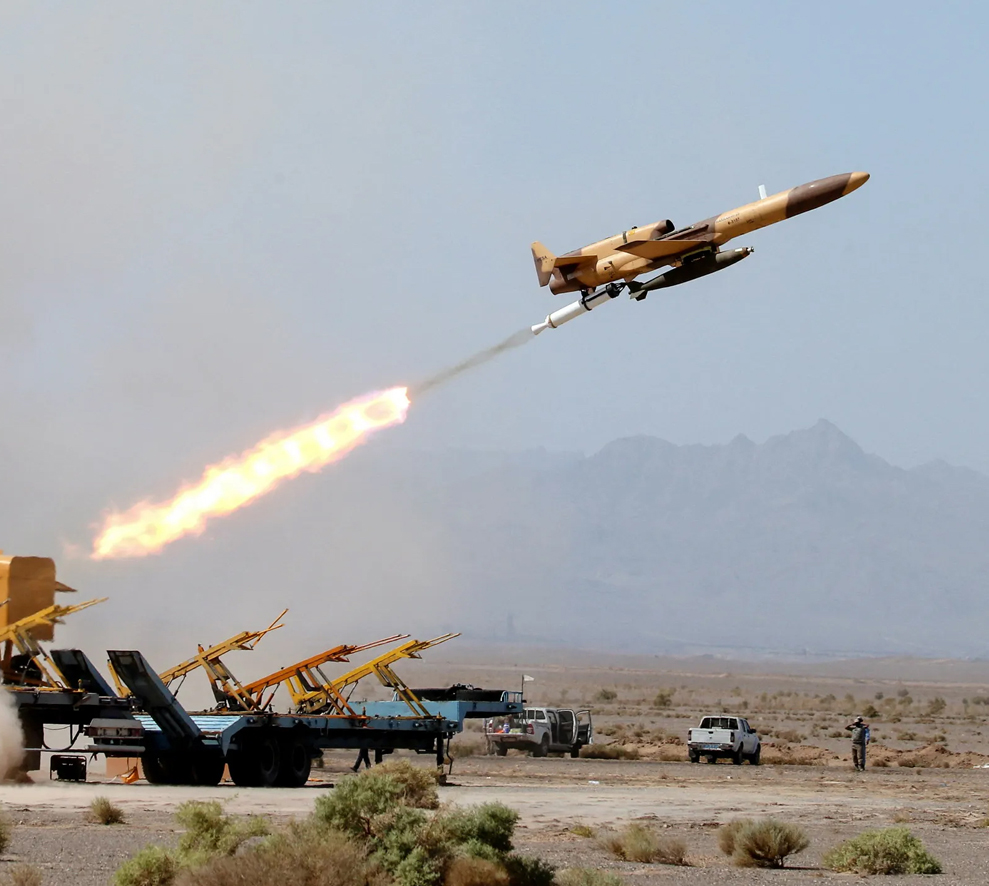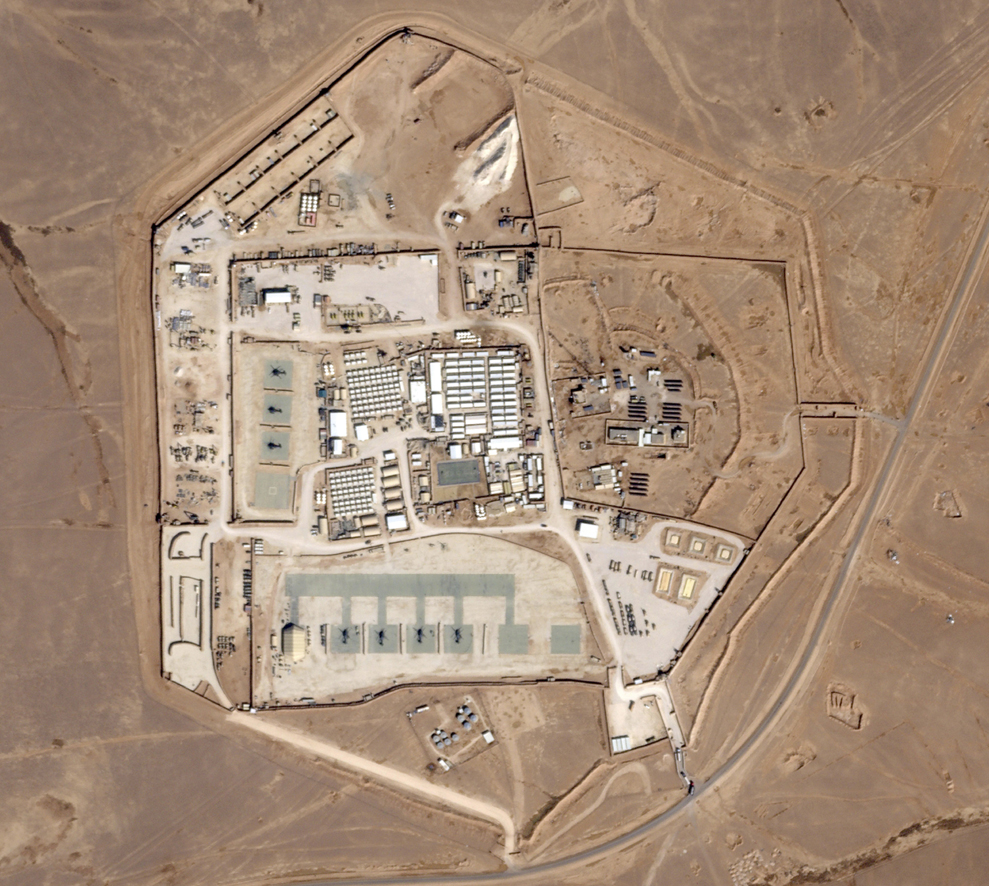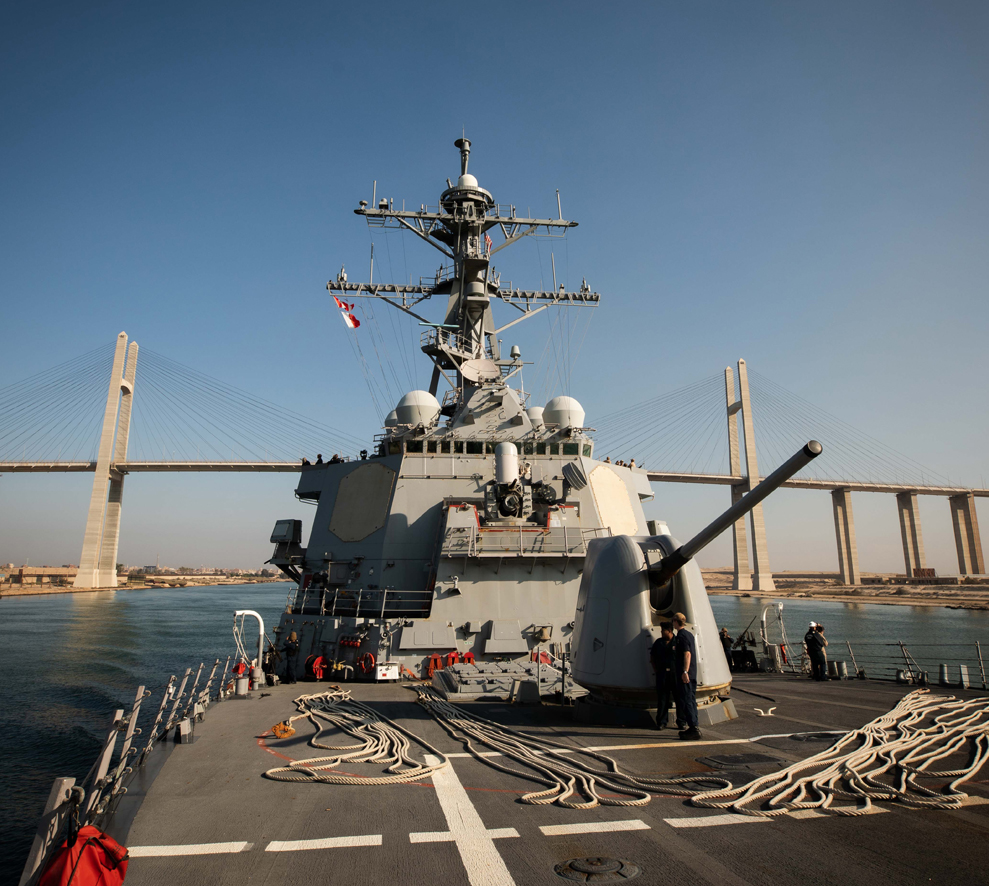Introduction
The issue of opening Ramon airport to Palestinian West Bank passengers first appeared after Israeli Defense Minister, Benny Gantz, met Palestinian Authority President, Mahmoud Abbas, in Ramallah on July 7, 2022, as part of an Israeli package of "facilities" in exchange for the Authority's failure to go to the International Criminal Court. It is the same matter that was referred thereto as one of the U.S. President Joe Biden's visit results to the region, in mid-July. Israel Today newspaper revealed that the Israeli Airport's Authority is preparing to operate the first international flights for Palestinians from Ramon Airport to Turkey in August 2022.
Later, on August 3, 2022, the Israeli news website (Ynet) published Israeli preparations details, and that the program "will initially focus on travelers from Bethlehem and Hebron in the southern West Bank, because the distance is relatively shorter for them. The travelers will experience the same steps that passengers go through, when they leave via the King Hussein/Allenby Bridge".
While the first flights of Palestinian passengers were supposed to head to the Turkish city of Antakya, the Israeli Ports and Airports Authority announced the launch of the first flight through the airport to Cyprus on August 22. According to the Yedioth Ahronoth newspaper, the flight carries "a group of doctors, pharmacists, and their families from the West Bank ..reaching Larnaca Airport in Cyprus". According to the Israeli airline "Arkia", the flight is intended for tourism purposes, and comes within the "framework of the experiment for a large-scale project". In the same context, the postponement of the opening the airline to Turkiye due to "delayed equipment" was announced. The plan indicated that the Turkish airlines "Pegasus" and "Atlas", will operate two flights a week, through Ramon Airport, to Istanbul and Antakya in Turkiye.
Many Israeli Interests
The project of operating Ramon airport for Palestinian passengers achieves many Israeli interests, at the economic and political levels. The airport is situated in the southern Negev desert, near the tourist city of Eilat, inaugurated on the 21st of January 2019, despite Jordan's objection to the airport's construction close to King Hussein Airport in Aqaba. Jordan filed a formal complaint with the International Civil Aviation Organization regarding this issue, in July 2015.
Since its operation, Ramon Airport, which is the second largest Israeli airport, has not achieved the successes expected, rather, it faced, and still to faces, many obstacles and failures, by virtue of the measures resulting from covid-19 pandemic at the beginning of the airport's establishment. Other reasons, such as the hot weather in summer. The Israeli media published a report entitled "We prepare birds: Ramon Airport does not Fly" four months after the said airport was opened, due to the decrease in the number of international flights. Also, the Israeli economic newspaper "The Marker" published a detailed report in May 2022 entitled: "20 passengers on 9 international flights: why does Ramon Airport not rise?" a report that intersected with other reports about the weakness of tourist and commercial traffic in the vicinity of the city of Eilat.
In this context, the great Israeli economic interest, in restoring life to Ramon Airport, is highlighted by allocating it to the travel of Palestinian citizens from the West Bank, perhaps from the Gaza Strip at a later stage, especially after spending almost $ 600 million for the airport's construction. However, this economic interest was not placed in its natural context when the project to operate the airport for Palestinian passengers was proposed, rather, it was directly related to political interests through several levels.
The levels of Israeli political interests, in the operation of Ramon Airport, are first represented in presenting the project of operating the airport as a "political price" offered by Israel to the Palestinian Authority, as part of the package of economic facilitations that represent the alternative policy of the Israeli government, to resume political negotiations. However, such these facilitations were not provided "for free ", but were related to the Palestinian Authority's pledge not to resort to international criminal courts or file lawsuits against Israel.
Added to this is Israel's strategic interest in deepening the Palestinian association with Israel, especially in terms if economy, through the institutions of the Israeli Civil Administration, led via the Israeli government's actions "coordinator" in the Palestinian territories. Add to that the gradually do away with the services of the bureaucratic institutions in the Palestinian Authority, in favor of strengthening the Palestinian Authority and its institutions "security" role, regarding the nature of relations between it and Israel.
Partial Palestinian Interests
In contrast to the multiple and clear Israeli interests in the Ramon airport project, the Palestinian interests seem partial and limited, as such interests are limited to some members of the political class in the Palestinian Authority, which concerned with the facilities provided by Israel, as well as to a segment of Palestinian citizens, especially merchants, whose commercial interests are linked to Turkiye and China, as well as owners of Palestinian tourist offices, in addition to travelers for tourism purposes, whether to Turkiye or to some European countries.
This project may also carry future interests, similar to those of Hamas and a segment of Palestinian citizens in the Gaza Strip, if expanded to include the citizens of the Strip. Nevertheless, those interests are likely to expand if the project succeeds in its pilot phase, and if later extended to include facilities in the movement of commodities' "import and export" through ports allocated for Palestinians, in Israeli sea and air ports.
Expanding Ramon airport project, and achieving Hamas interests through it, are not unlikely to happen, due to the undeclared Turkish role in the project. The airlines concerned with organizing the flights of Palestinian citizens, to and from Ramon Airport, are Pegasus and Atlas of Turkiye, based on Turkish-Israeli agreements. Selecting Turkish airports, as a central station for travel to and from Ramon Airport, contributes to strengthening the Turkish political role, and also contributes to the Turkish economic cycle, in the event that its airports are considered the gateway of Palestinians to the world, in light of the circulation of unofficial news about The Turkish government's intention to exempt Palestinian passport holders from the visa to enter its territory. This is in addition to the main Turkish role in the "Jenin Industrial Zone" project, in partnership with Israel, a project that Turkish President, Recep Tayyip Erdogan, announced the start of its first operational phase in February 2021. This project constitutes a link between the West Bank and the Israeli port of Haifa.
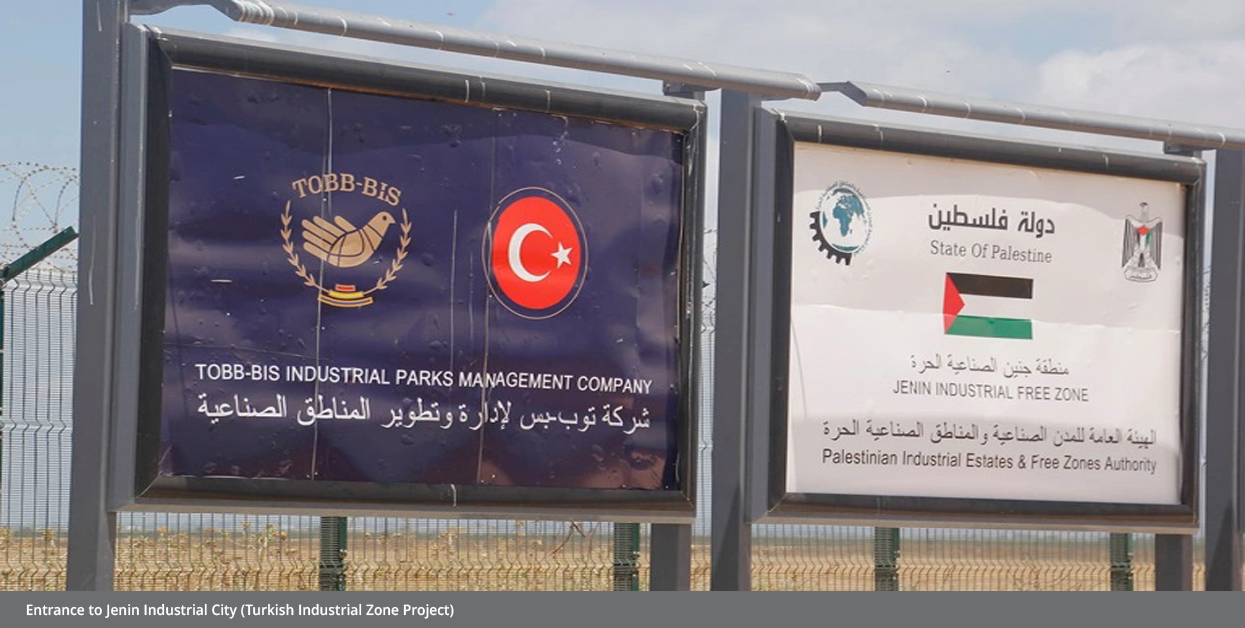
However, contrary to the partial and limited Palestinian interests, the overall and strategic risks of weakening the Arab depth of the Palestinian cause, a depth which Jordan is its backbone, are highlighted by strengthening the official Palestinian subordination to the Israeli situation, at the expense of Jordanian-Palestinian historical relations.
Palestinian Stances
The official stances of the Palestinian Authority, so far, seem to reject Ramon airport project, as reflected in the statements of some state officials. However, such stances, "theoretically" rejecting Ramon Airport project, remain questioned about their seriousness in light of some indicators, such as:
First: Not to issue any official statement by the presidency of the Palestinian Authority, the Palestinian government, or even the Civil Affairs Authority, that may include a clear and specific stand regarding the project. Only brief statements were surfaced in the local mass media.
Second: the Palestinian Authority's approval, and even its participation, in using Israel's Ben Gurion Airport, to the travel of VIP card holders from senior Palestinian Authority and Fatah figures, besides business leaders who hold BMC card, in addition to a small segment of the Palestinian citizens with special permits. thus, it became difficult for the Palestinian Authority to take a position rejecting Ramon airport project on "sovereign" or "political" causes.
Third: Not to take any action on the ground against tourism offices, known and registered in the West Bank, openly working to organize the procedures of the first test flight, and publish their advertisements and competitive offers on the upcoming flights.
Fourth: The Palestinian Authority's intervention late during the acute crises, witnessed at the King Hussein Bridge in July and August 2022, an intervention that came after mediation by Morocco with Israel, despite the clear Israeli responsibility for those crises, and its full control over work hours and travel procedures.
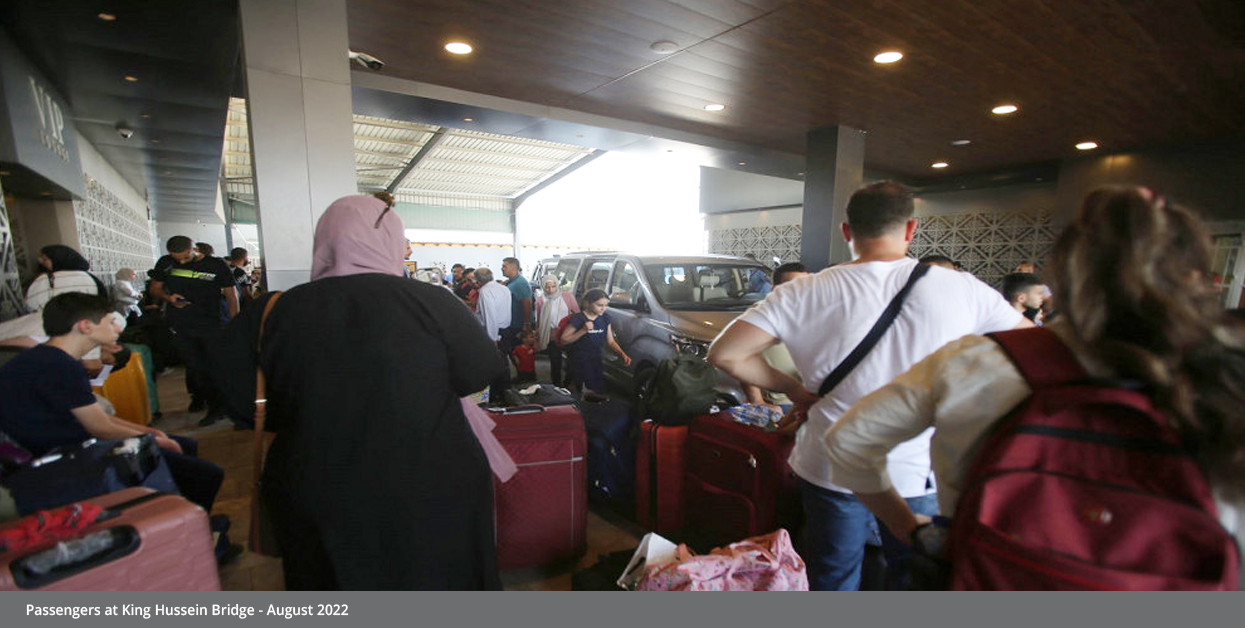
Therefore, the first test flight will be a test of how seriously the Palestinian Authority may reject the project, especially after the Palestinian Minister of Transport and Communications warned to impose sanctions on Palestinian users of the airport if it is operated.
At the level of Palestinian popular attitudes, welcoming Ramon Airport project appears at the aforesaid groups, which may benefit from. However, such welcome does not reflect the general mood among the Palestinian citizens in the West Bank, as the King Hussein Bridge, or the Karama Crossing in the Palestinian name to it, is not just a border gate between Jordan and Palestine, also, the Hashemite Kingdom of Jordan is not just a "neighbor" state that opens its international airport as a gateway for Palestinians to the world. Palestinian-Jordanian relations cannot be reduced to a border crossing here, or an international airport there.
Consequences on Jordan
If the gains from the Ramon Airport project are Israel's share, and, to a much lesser extent, for some Palestinian segments and groups, the expected losses, in return, will be for the Hashemite Kingdom of Jordan and, to a relatively lesser extent, for large segments of Palestinian citizens, especially in the West Bank.
As for Jordan, direct economic losses, in the short and medium terms, will be reflected in the decrease in the number of Palestinian passengers across the King Hussein Bridge. This was expressed by the owners of Jordanian tourism agencies and travel offices. It is estimated that more than half of the customers and clients of these companies are West Bank Palestinian citizens. According to the Director of the Bridges Security Department Rafat Al-Maayta statements, about one million Palestinian citizens annually cross the King Hussein Bridge. According to rough calculations and reports, it is estimated that Palestinian passengers through Queen Alia Airport spend annually about $ 12 million for airport transportation fees, food, etc., as well as the taxes spent by Palestinian citizens on the bridge, estimated at about $ 25 million, in addition to millions of dollars in shopping and buying gifts, as stated by the director of the airline "Fly Jordan" Ibrahim Shati, that Palestinians constitute 70% of the customers of Jordanian airlines. This led the Jordanian Association of Travel and Tourism Agents To call on the Jordanian official authorities to take a position that meets the expected problem's acuity, resulted by the operation of Ramon Airport.
But in the long run, if Ramon Airport goes ahead with the announced plans, the Jordanian losses will be greater than the statistics of Palestinian "spending" and the impact of its decline on the tourism sectors and service offices. Such loss will take on a political character, via weakening the status of Queen Alia International Airport as a transit gate for Palestinians to the world, in favor of Turkish airports, especially Istanbul International Airport. Perhaps even Ramon Airport itself might be considered as that gateway by organizing direct flights for Palestinian passengers to many from world capitals. In addition, to allocating import and export routes at Israeli sea and air ports to Palestinian traders, at the expense of land trade crossings linking the West Bank to Jordan.
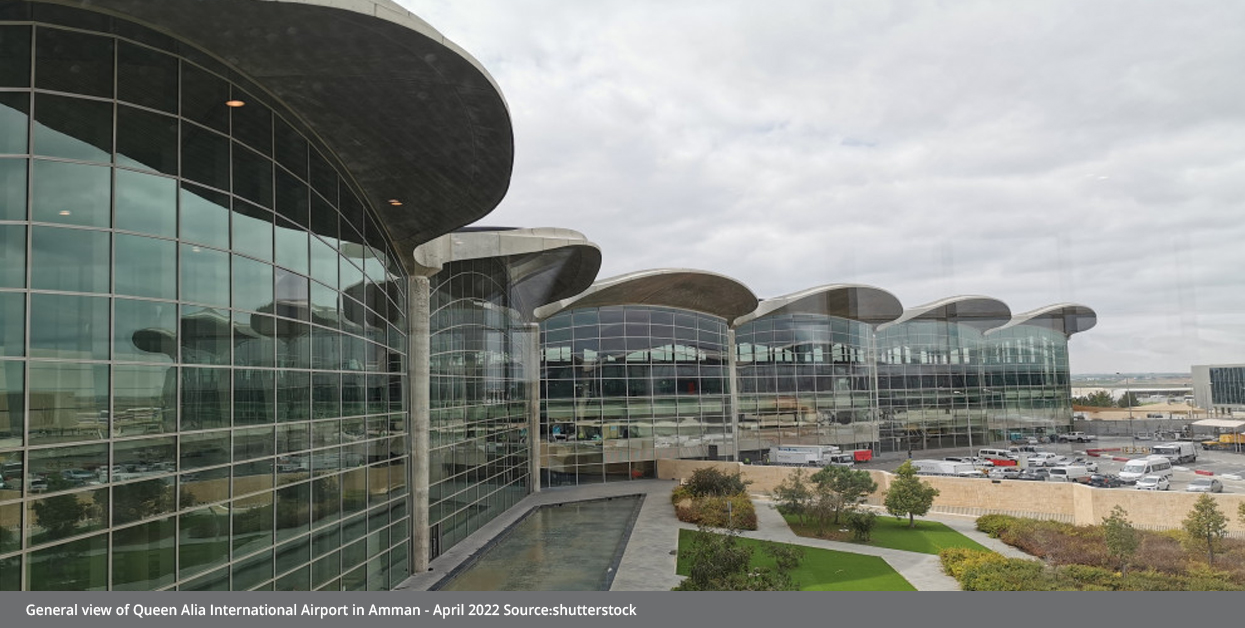
Recommendations for Jordan
Jordan has the most important strategic interests in strengthening the Palestinian-Jordanian relations on a hand, as well as in promoting the Arab depth of the Palestinian cause on the other. On another perspective, there is a lack of sovereignty by the Palestinian Authority in the West Bank, added to the depth of its economy's attachment to Israel, which makes the Palestinian Authority unable to influence, even if it wishes, the course of the Ramon Airport project, or other projects that affect the Palestinian-Jordanian relations, and affect the Jordanian national security system.
The said increases Jordan's responsibility towards the Ramon airport issue, in addition to the fact thar Jordan is shouldering a part of the responsibility for what the events became due to chronic "bridge problems", whether related to infrastructure and services, or the difficult procedures, specifically in the overcrowded seasons of summer.
All of this means that the solution starts from Jordan, but such solution will be neither easy nor quick, as much as it is part of a long-term strategy, aimed at strengthening Palestinian-Jordanian relations, consolidating the Arab depth of the Palestinian cause, and providing maximum facilities to Palestinian citizens at the Jordanian crossings and airports.
A set of Ideas as suggestions may contribute in the desired solution, such as:
First: Jordan's strengthening of the official Palestinian stance rejecting Ramon project. In addition to taking steps forward, in this context, by coordinating bilateral positions at the highest levels, on the basis of the Palestinian right, as per the agreements signed with Israel, regarding Palestinian airports. Also, demanding the handover of Qalandia airport to the Palestinian Authority, constructing a new Palestinian airport in the West Bank. Activating the Palestinian security, and civil role on the King Hussein Bridge, which are also based on the agreements signed. Pressuring on Israel, with all possible means, to open bridges in a durable manner for both directions.
Second: Developing roads and communication networks, linking Jordan to the West Bank, not only in the Jordan Valley and the perimeter of the bridges, but also from the capital Amman, to the farthest border point on the Jordan River.
Third: Developing, and radically expanding, the infrastructure of the King Hussein Bridge and its facilities, on the basis of latest standards of comfort and speed of completion, and not to underestimate the importance of sanitary and hygiene facilities, air conditioning and cooling networks. Especially since the condition of these facilities is of lower quality, compared to the facilities on the Israeli side of the Bridge.
Fourth: Expanding the infrastructure of the Sheikh Hussein Bridge, in order to open special routes for the travel of Palestinian citizens from the West Bank, and not to limit it to the travel of Israeli passport holders, which relieves pressure on the King Hussein Bridge.
Fifth: to facilitate the travel procedures, in both directions, to the maximum extent possible, in coordination with the Palestinian Authority, in a way that ensures the speed of passage and non-congestion, whether through the full computerization of the "Que" system, the speed of completion of document checks, baggage inspection, ticket reservations, bus traffic, and other procedures.
Sixth: Reducing the financial burden of travel, by reducing the 10-dinar tax on those coming from the West Bank who hold green cards, and adjusting the pricing of public transport from the Bridge to Jordanian city centers, and vice versa.
Keep in touch
In-depth analyses delivered weekly.

Related Analyses:







